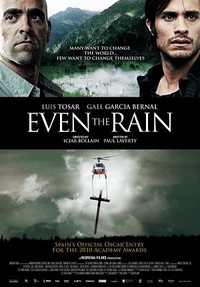#EvenTheRain
Even the Rain
Even the Rain is a 2010 Spanish drama film directed by Icíar Bollaín about Mexican director Sebastián (Gael García Bernal) and executive producer Costa (Luis Tosar) who travel to Bolivia to shoot a film depicting Christopher Columbus’s conquest.
Read More..
Ratings
Likes
Reviews
None
9 years ago
Movies of resistances like Even the Rain will continue to unite people to reclaim the commons.
Fiction has an uncanny ability to drive home a point and nail it down your brain. To Kill a Mocking Bird exposes racism stripping it bare. The Great Dictator makes fascism scarier than any documentary on dictators who may have and still are roaming around the world. In the same league, Even the Rain sheds the clothes of privatization efforts on the commons.The PlotSebastian, played by Gael Garcia Bernal (the young Che from the Motorcycle Diaries) is a Mexican film maker who is working on a shoestring budget. He and his executive producer Costa, in their bid to reduce the cost of production, travel to Cochabamba in Bolivia to make a movie. It’s just 2 $ a day for hiring extras. The movie is about the dark side of Columbus’ discovery of America and the bloodshed that accompanies his entry into the Americas. Before starting the production of the movie, they put up an ad for the screening of some local actors. Hundreds of men and women braving the hot sun turn up. Facing a long queue, Sebastian and Costa decide to pick a few people at random and send off the rest. This is when Daniel, a localite, arrives at the scene and demands that all the people present there be given an opportunity to audition. Impressed with his skills, Sebastian and Costa choose him to play the role of Atuey, an Indian chief who leads a rebellion against Columbus. Daniel also turns out to be the chief who is leading a rebellion against water privatization in his locality.The Politics of WaterOne common denominator in most privatization efforts on water is the pressure of international lenders and/or MNCs. Those in favor of privatization argue that state provided services are inefficient, corrupt and largely ineffective. However, in cases where this doctrine was applied, powerful private monopolies were created and prices have almost always increased. From the beginning of 1980s until 2000, huge pressure from international financial institutions and multinational corporations has led to privatization of public water companies. Five major corporations, Veolia, Suez, Agbar, RWE and Saur, held 71% of the global water market in 2001.In South Africa, privatization of water supply resulted in one of the worst cholera epidemics in the poor neighborhoods of Johannesburg in 2000-02. Slums were disconnected since their residents could not pay the hiked up bills resulting in consumption of contaminated water from rivers. Manila was regarded as a success story for privatization efforts of water as prices fell to half in the first few years because of competition but things started to change later. Prices went up by 500% in 4 years and the average family spent 10% of income on water bills. As a result of poor maintenance of pipes, 800 people were affected by cholera. The last decade and a half saw protests against privatization efforts around the world. In the last 15 years, 235 cities in 37 countries have brought water services back under public control benefitting 100 million people.Interesting alternatives have propped up across the globe – from water cooperatives to public – public partnerships. Aguas Bonaerenses Sociedad Anónima (ABSA), a workers’ cooperative, has been heralded by the UN as a model water company. The province of Buenos Aires has 10 million inhabitants distributed over 74 cities with 48 municipalities, which is served by ABSA. The workers’ cooperative filled the space vacated by Enron. In Huancayo, a city in central highlands of Peru, water movements have developed an innovative public-public partnership (PUP) as an alternative to privatization. The social movement organization FREDA JUN (Frente de Defensa del Agua de la Región Junín) successfully resisted privatization and, in a participatory bottom-up process, developed an alternative proposal to reform the public utility, SEDAM and successfully established a public-public-partnership with ABSA. Water is a scarce resource and increasingly becoming more scarce thanks to climate change. Private interests to wrest power on scarce resources will continue. Movies of resistances like Even the Rain will continue to unite people to reclaim the commons.
 2 Likes
2 Likes
 DisLike
DisLike
Popularity
Ranks
This #hashtag is not ranked yet.

